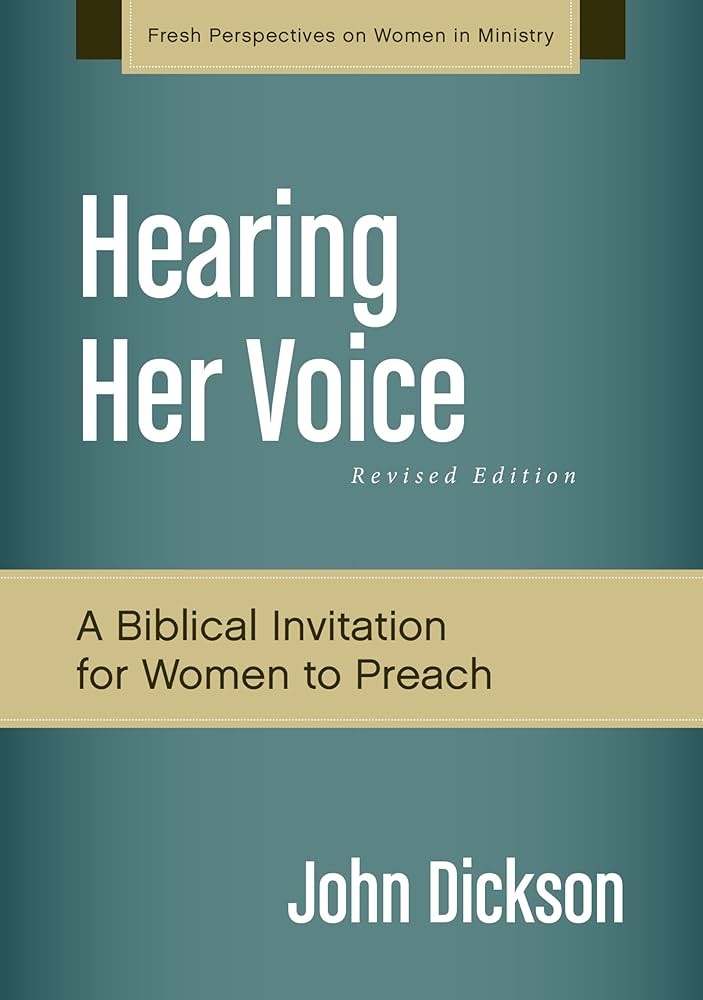Review: Hearing Her Voice

The role of women in ministry has been endlessly debated both within and outside Sydney Anglican circles. I’d say it’s a bit of a theological hot topic, except the coals are pretty cool on this fire. Each camp is fairly well entrenched, and there are not a lot of new arguments to bring to the table that may sway someone to the alternative view.
At the centre of this book is an examination of 1 Timothy 2:12:
12 I do not permit a woman to teach or to assume authority over a man; she must be quiet.
This verse (and the surrounding verses in context) have had more than enough ink spilled over them. Is it a deeply misogynistic view of the Apostle Paul that has no place in our time? Perhaps it is a clear expression of a deep biblical truth that some have taken far too personally? Or, as Dickson suggests here, it’s a complex verse that has suffered from much misunderstanding and misapplication.
Dickson has a fairly clear premise in the book: the word ‘teach’ in the verse quoted above has a very technical sense of meaning to it, and ought not be understood as equivalent to many sermons that occur in our churches today.
His argument, to this less-than-scholarly reader at least, is well laid out and is reasonably compelling. In sum, Dickson seeks to show that there are many types of speech mentioned in the New Testament that are clearly distinct from one another (even if there is some overlap): exhortation, prophecy and teaching. And only one of these does Paul forbid women to be involved in. ‘Teaching’, especially in the Pastoral Epistles, has a very specific meaning that refers to the deposit of truth entrusted to the Apostles to be passed on.
On this basis, much of what we do in modern sermons is perhaps closer to ‘exhortation’ than ‘teaching’ in this technical sense. Dickson argues that we should (rightly) seek for every opportunity to hear the voices of women in church life (who have often been minimised in the past) and not exclude them from doing what the Bible itself doesn’t exclude them from doing. Hence, women should be able to give (some) sermons. (The ‘some’ is to recognise, according to Dickson, that types of preaching are on a spectrum, and some may be closer to exhortation, while others are closing to ‘teaching’ in this technical sense.)
It’s a short and relatively straightforward read, though you probably need an interest in the topic, or in getting a bit nerdy in theology to appreciate it.
Naturally, the book hasn’t been without controversy. Matthias Media subsequently published a book of essays to refute Dickson’s arguments, to which Dickson wrote a lengthy paper in response to express his frustration in how the essays had largely misunderstood his argument. I found Dickson clear enough to sympathise with his frustration.
Who wrote it
John Dickson is an Anglican Minister, Historian and author of many books.
Why I read it
It’s a little tangential to my upcoming series on identity and sexuality. In wanting to get a bit of breadth on the subject, I wanted to write a personal paper on the verses of controversy in 1 Timothy 2. This was an obvious read to that end.
What I liked
I really liked the way Dickson slowly unravelled his argument. It was plain, straightforward and I found it easy to follow, and compelling enough. I like how he kept a relatively narrow focus for the book, when there are potentially endless rabbit holes that you could get lost in.
What I didn’t
I appreciated that Dickson didn’t want to be too prescriptive by attempting to describe in detail the differences between exhortation, prophecy and teaching. Doing so would only create significantly more opportunity for people to debate the trees and miss the forest. I think he was right to leave it to the reader to use their imagination. Yet I still find myself wanting greater clarity on a topic that perhaps simply cannot be achieved.
Major Takeaway
Overall, I felt like I have a clearer understanding of some of the issues involved in the interpretation of 1 Timothy 2. There’s plenty more learning to do, but this book was insightful. Although I have largely felt agnostic about this passage, and found it difficult to wade through various arguments, this book cut through via its narrow focus. It has no doubt given me a lens with a little more clarity to read others commentate on these verses.
This quote is a little tangential to the argument (but only slightly). I found it a helpful perspective.
Others avoid discussions about prophesying because of its “spooky” connotations. In evangelical circles, too much has been made of the supposedly impromptu and Spirit- led character of prophecy, as if these two qualities are what distinguish the activity from preaching, teaching, exhorting, and so on. The emphasis on these twin characteristics of “prophecy” in charismatic circles today makes those of us who worry about such excesses all the more nervous about even discussing contemporary analogies to prophecy. But perhaps our charismatic friends have simply done with prophecy what evangelicals have done with “teaching.” They have appropriated the biblical word for their own church experience, and this in turn defines its usage for everyone in the group.
Who should read it
Only really worth a read if the subject is of particular interest to you. It’s not difficult, but it is a little nerdy and niche.
